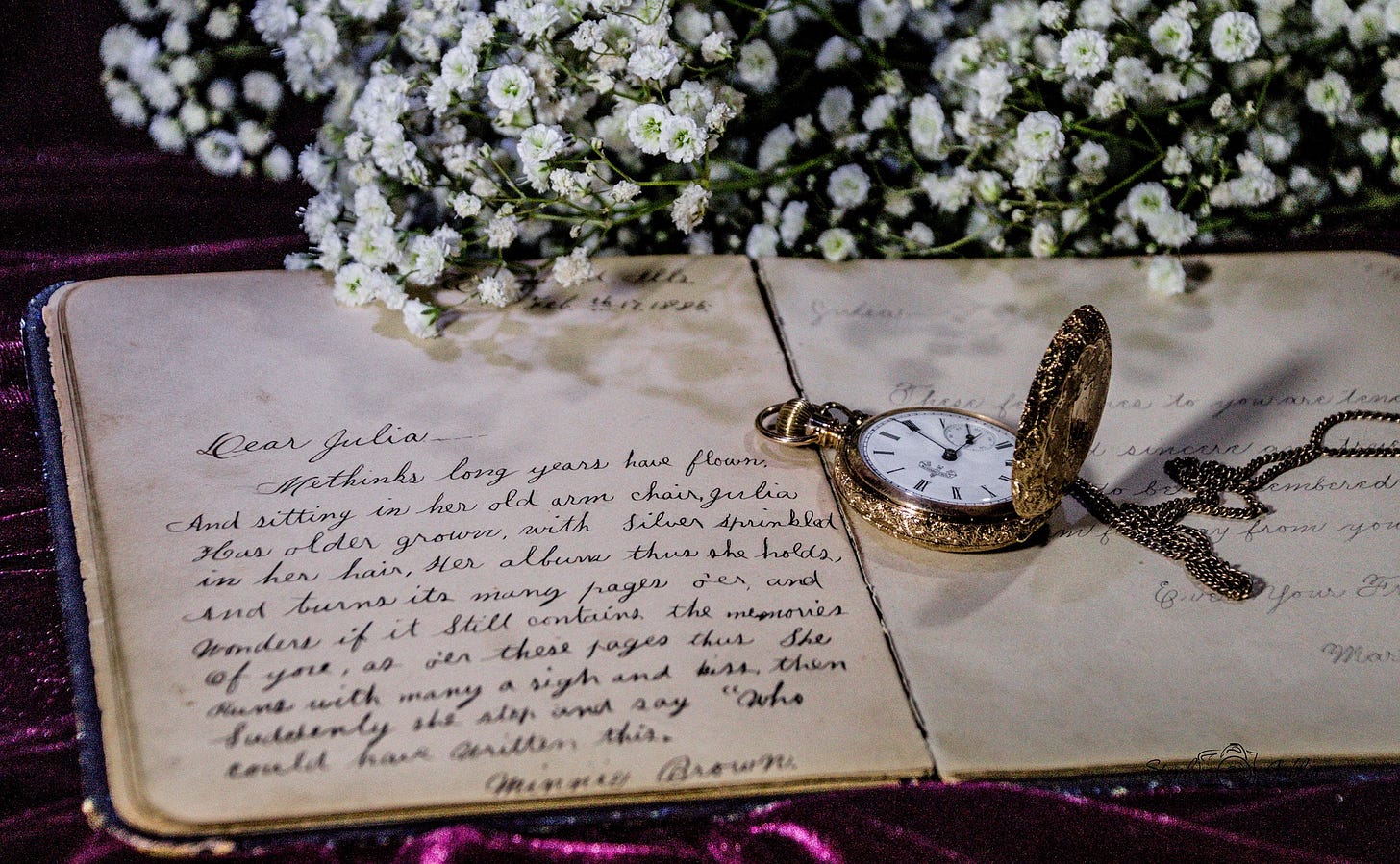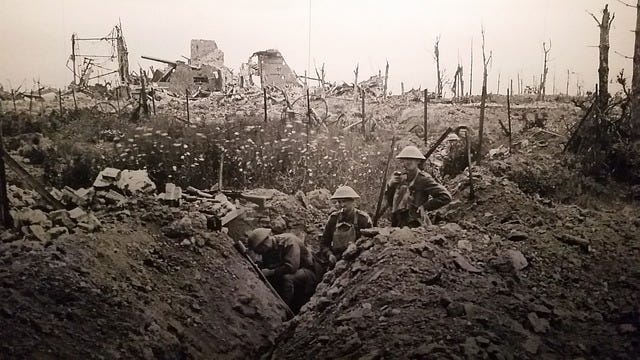When it Comes to Dying for a Country, it's Better not to Die at All
Accidental Hero #5 - A romance with one foot in the past
Continues from Ep. #4 in which we learned some back story relating to Walter, the owner of the medal Ben & Verity are researching. Walter proposed to Hetty, on a trip to the coast, but their day out took a nasty turn. CW: War, death and dying

Dearest Hetty
It’s lucky I joined the army not the navy, as I discovered that the motion of the sea makes me very sick. The sky is a bright blue, and the water a deeper shade, but I can’t say more.
I hope you are well. I wish I had news of you and my mother, but nobody’s letters are getting through.
Before I left, the trees were threatening a bumper crop of apples. I imagine my mother baking pies and turnovers and making chutney, with nobody there to eat them. I miss home cooking, although the food on board the ship has been grand.
Best regards; Your ever-loving Walter
When our ship eventually reached Gallipoli, we crowded on deck for the first sight of land. Everyone wore their kit pack on their backs and tin helmets to protect their heads. Gulls circled in the sky above. Seeing sand might have reminded me of that day out in the charabanc when I’d walked with Hetty on the pier. But nothing about this shore looked welcoming.
There was a narrow strip of beach leading to a steep cliff. Sandbags were stacked everywhere like makeshift walls, and I observed wooden ramps that I later learned were open-air latrines, crudely designed so that waste fell into a trench.
On board the ship, our officers told us we’d be ferried to the beach in a series of boats. Once in the shallows, we should get sheltered behind sandbags as quickly as possible, because Turks with munitions were stationed out of sight on the cliff.
I didn’t like these odds, but what could I do? When you’re in the army you follow orders and hope that the top brass have considered all the options.
“I hope you can swim, Walter,” the fellow beside me joked.
His name was Arthur, and he was a farmer from Ixworth. Before we reached the beach, he was hit. He fell face into the water, the weight of his kit made him sink. Shrapnel was flying all around us. All I could think was, I have travelled all this way and never raised a weapon, but I’m going to die.
I scrambled off the boat before it went aground and ran hell for leather, throwing myself behind the sandbags. Not all the men were so lucky, many bodies from the ship littered the sand and the water, picked off by enemy snipers on the high ground. There was a bottleneck of soldiers disembarking to smaller boats to access dry land, which made them easy prey. Too many men lost their lives on the beach.
Things weren’t much better once we reached the cliff. An officer bellowed a warning not to put our heads above the parapet at the risk of getting it shot off. It seemed chaotic. The Turks were in position with machine guns and rifles, our allies struggled to gain any ground, although I learned the master plan was for us to capture the Dardanelles, then advance towards the Turkish capital.
What little sleep we got was snatched sitting up in the sandbag trenches. I’ve never experienced such heat and water was scarce. Many men couldn’t get the hang of rationing themselves to make it last and became delirious. I have never been so thirsty: I’d dream of autumn days with crisp frost on the ground. Cracking ice to fetch water from the pump seemed an idyllic memory, and I often dwelled on those teas with cakes that Hetty and her mother laid out for the cricket team.

Dearest Hetty,
I always thought of Hell as a place of infernos and the fires of damnation, but I imagined it wrong. Hell is millions and millions of filthy flies swarming everywhere. The sides of the trenches are black with their bodies. They land immediately on any kind of food you open, which fills me with dread and disgust. Eating is a torment, they’re on your food and crawling in your mouth. We drape nets over our heads and bodies and hasten to pull our food under them to eat in peace.
I miss you, my darling, but I am heartened when I picture you at home with your family. I hardly dare ask for news of HC, our letters are vetted.
I hope my mother keeps well. Please tell her I am safe.
Wishing we were not so far apart — ever yours;
Walter
I have befriended a soldier named Dan who mans the radio. He receives and sends communications from the top brass to the officers on our beach and along the coast where other allies have landed. He’s a gentle soul; before the war he worked in a bank. Dan records the messages, which are usually coded, and relays them. He’s shown me how the radio works and I’m learning to read Morse code.
We’ve been here almost six months. Today, at last, a bundle of letters arrived from home. I received several from Hetty and secreted myself in the little nook created to house the communication equipment to read them. Usually, I sit here with Dan as a respite from typical time in the trenches. It has a makeshift corrugated roof, which provides shade and some soundproofing, but also keeps us out of sight from the snipers. They pose a constant threat, creeping around the headland to shoot at us, at all hours of the day and night.
Dan talks about his girl, Frederica, who he plans to marry when he goes home on leave. This makes me miss Hetty keenly. At night, when it’s hard to sleep, I worry about what she made of my choice to run away. I’m no coward, but I’d killed Harry Crawford, and couldn’t stand the thought of going to prison.
I opened Hetty’s first letter and began to read eagerly. I swiped the tears from my eyes. Her sweet voice sounded in my head as I read her words.
Harry is not dead, but he stayed in hospital for several weeks with a concussion.
With my heart pounding, I held the letter to my chest and let the facts sink in. Harry was not dead, I had not killed him. I would not be tried for murder, but it was likely my conduct would be addressed.
“Bad news, old boy?” Dan asked when he saw me. I wrestled my emotions back in check.
“Not at all,” I smiled and eagerly tore open dear Hetty’s next letter, seeking more news.
My mother was well, Hetty’s sister had given birth to a baby girl and my mother was knitting the babe a bonnet and bootees. Hetty loved me and was waiting, praying for my safe return.
I re-read those letters repeatedly, scraps of news from home were what got me through the tough times. Joining the army and being sent to war seemed a just punishment for what I had done that day, although I would likely face trial for it. I was prepared for that if I survived this ordeal.
Hearing that Harry Crawford was recovering was the best news I could wish for, unless our officers told us it was time to pack up and go home. Increasingly, I wondered how many of us would escape Gallipoli alive.
Thanks to The Imperial War Museum site for sharing the voices and accounts of soldiers who fought in the trenches and at Gallipoli. To be continued (on Thursday) A fictional story blended with facts gleaned from various historical sources. The title is a quote from All Quiet on the Western Front. Series originally appeared on Medium.




That part was hard to read....😔💙
Excellent telling of the Gallipoli campaign, Posy. An almost year long nightmare. I won't go on to ruin anything but you're doing a heck of a job. You have done your homework. Enjoying this read very much. - Jim